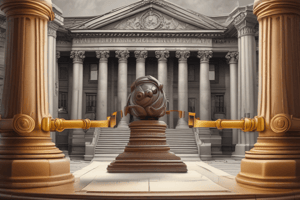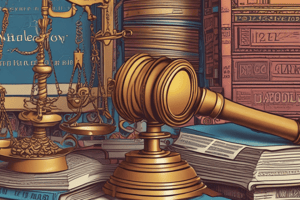Podcast
Questions and Answers
What does the 10th Amendment state regarding powers not delegated to the federal government?
What does the 10th Amendment state regarding powers not delegated to the federal government?
- They are delegated to the states. (correct)
- They are exclusively held by the federal government.
- They are retained by the people.
- They are granted to international authorities.
What is a key purpose of libel laws?
What is a key purpose of libel laws?
- To allow any false statements to be published without consequence.
- To promote unregulated freedom of speech.
- To balance media freedom with accountability for false statements. (correct)
- To ensure that media outlets are free from scrutiny and accountability.
Which of the following best defines defamation?
Which of the following best defines defamation?
- A false statement that exposes an individual or company to ridicule or contempt. (correct)
- A truthful statement made in jest or humor.
- An accurate statement that promotes a positive image.
- A false statement that does not harm an individual or business.
In a libel suit, who is typically named in the case?
In a libel suit, who is typically named in the case?
What is the primary characteristic of libel?
What is the primary characteristic of libel?
Which of the following best defines defamation?
Which of the following best defines defamation?
Which of the following is NOT a critical element in a civil libel case?
Which of the following is NOT a critical element in a civil libel case?
Which of the following statements about slander is true?
Which of the following statements about slander is true?
In a libel case, what must the plaintiff prove about the statement made?
In a libel case, what must the plaintiff prove about the statement made?
Which scenario could legally constitute libel in fiction?
Which scenario could legally constitute libel in fiction?
Flashcards are hidden until you start studying
Study Notes
The 10th Amendment
- The tenth amendment states that powers not delegated to the federal government, are delegated to the states
Libel Laws
- Libel laws create a balance to the First Amendment freedom of the press.
- Libel Laws serve as a check on the power of the media, and hold editorial decision-makers accountable for false and damaging statements.
Defamation
- Defamation is a false statement that:
- Exposes an individual or company to ridicule, hatred, or contempt.
- Injures an individual or business.
- Libel is a false statement in written form, including broadcasts in many states.
- Libel can be a civil criminal offense
- Civil Libel is a case brought by a plaintiff claiming defamation in published material.
- Slander A false statement spoken.
- Libel in Fiction - A person can sue a novelist if a character is recognizable and defamatory
Key Elements in Libel
- To prove a case of libel, the plaintiff must prove these five elements:
- Statement of Fact: Can be proven as true or false.
- Publication: The defamatory statement is circulated.
- Identification: The plaintiff must prove the statement refers to them.
- Defamation: The statement damages the plaintiff’s reputation.
- Falsity: The statement must be untrue.
- Fault: Negligence or actual malice (reckless disregard for the truth)
Types of Defamation
- Fault Involves negligence or actual malice (reckless disregard for the truth)
- Slander - Spoken defamation of character.
- Libel in Fiction - A person can sue a novelist if a character is recognizable and defamatory
- Libel per se - An outrageous statement that implies criminal or disgraceful behavior.
- Categories include:
- Imputation of a crime of moral turpitude.
- Infection with a contagious disease.
- Unfitness for a job or lack of integrity in duties.
- A statement that would naturally suggest a criminal or disgraceful accusation to an intelligent person.
- Categories include:
- Libel without being named? Anonymous or fictional individuals can demonstrate their recognizability, and sue for Libel.
- Businesses and Defamation - Businesses can sue for libel if damaged by defamatory statements.
Landmark Libel Cases
- New York Times v. Sullivan (1964)
- Established the "actual malice" standard for public officials in libel cases.
- Public officials must prove the falsehood was made with actual malice (knowing it was false or reckless disregard for the truth) and was related to their official conduct
- Even though Sullivan wasn't named in the ad, the court ruled the statements were "of and concerning" him.
- The Trial court awarded Sullivan $500,000; on appeal the verdict was upheld by the Alabama Supreme Court.
- The NY Times appealed to the U.S. Supreme Court.
- Butts v. Saturday Evening Post (1963)
- The Saturday Evening Post published defamatory information based on unreliable sources.
- The Supreme Court upheld the libel award for Butts, due to negligent reporting.
- This case highlights the extended First Amendment protections, which require public figures to prove actual malice.
Libel Cases & Defenses
- Texas Beef Group v. Winfrey (1998)
- Oprah Winfrey was sued under Texas' False Disparagement of Perishable Food Products Act.
- The case focused on a discussion of mad cow disease on Winfrey's show "Dangerous Food."
- The case was dismissed because the plaintiffs failed to prove a knowing false statement from Winfrey.
- Winfrey stated she was not going to eat beef.
- Texas cattle ranchers claimed the statement caused hysteria.
- Ranchers argued the statement wasn't based on scientific truth.
- The ranchers sued for $110 million in damages.
- A U.S. District Court Judge dismissed the case because the plaintiffs failed to prove that cattle are a "perishable food."
Libel Defenses
- Truth - The best legal defense against libel is proving the statement is true.
- Substantial Truth - Minor inaccuracies don't matter if the core essence of the statement is true.
- Opinion Statements of opinion are protected, especially if labeled as such.
Negligence and Actual Malice
- Negligence - Failure to exercise reasonable care, such as relying on unreliable sources or making careless errors.
- Actual Malice - Deliberately publishing false information or with reckless disregard for the truth.
Additional Libel Protections
- Wire Service Defense - Media outlets are protected from libel suits based on reports from reliable wire services.
Anti-SLAPP Laws
- Protect individuals and organizations from frivolous lawsuits that attempt to silence them.
Emotional Distress and Defamation
- Intentional Infliction of Emotional Distress - Requires the plaintiff to prove severe emotional harm caused by the defendant's actions.
Studying That Suits You
Use AI to generate personalized quizzes and flashcards to suit your learning preferences.




